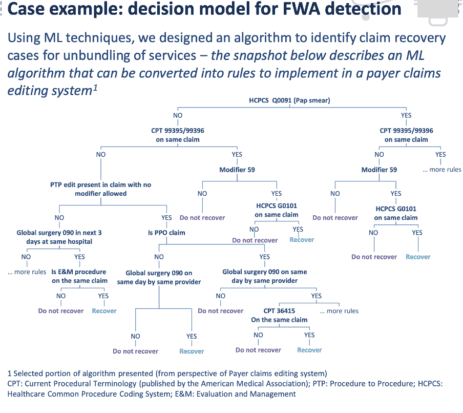According to a study by Accenture, AI could significantly improve operations and boost the health payer bottom line.One way to accomplish this is by automating processes across billing, customer service, claims, enrollment and quality and compliance. The report concludes that automating functions could generate $1.5 million in operating income for every hundred employees at payers. According to a different Accenture survey, 72% of executives at payers believe that AI will be among the top three strategic priorities for their company within the year. In the near-term, they hope that AI will be used to anticipate and resolve questions from customers, accelerate the prior authorization and clinical review of claims and to improve the process of benefits loading and design.
The biggest potential savings could come from using AI to anticipate and respond to customer demands. AI could unlock $2.1 billion for health insurers in this one area alone, as well as a further $1.4 from managing membership and billing, $1.1 billion from managing and supporting reimbursement, $1 billion from managing networks and providers, $900 million from performing health management and $500 million from managing quality improvement and compliance.
Managing customer interactions is the biggest slice of the pie, and AI could allow us to predict what customers will ask based on earlier calls and other data. It could then help a cell center rep to satisfy the customer’s needs through a more targeted interaction.
Virtual agents could take care of the simpler interactions and answer questions without human intervention. We could use AI to anticipate needs and to provide just-in-time information based on whatever the customer is asking for. Accenture’s analysis also showcases two other areas that insurers should focus on in the short-term, which are accelerating prior authorization and the clinical review of claims and improving the process of benefits loading and design. If this sounds like what we discussed for providers, that’s because it is. The administrative work in healthcare occurs between payers and providers, so technologies like NLP, computer vision and AI-enabled RPA will help both sides with coding reviews, prior authorization, and form completion.
Accenture also provided proposals for AI and machine learning that could demonstrate an impact on operating income in the near-term. For example, robotic process automation (RPA) could automatically approve prior authorization requests. In fact, Express Scripts is already doing this, helped along by their acquisition of eviCore for $3.6 billion in 2017. AI could help employees to focus on decision-making and those more creative processes that need human intervention and oversight. This could unlock capacity within the institution because payers won’t need to scale future jobs if their roles can be automated by AI. As is the case in every part of the healthcare value chain, the key barriers include poorly defined governance, mismatched or poor quality vendors and unsuitable existing infrastructure.






